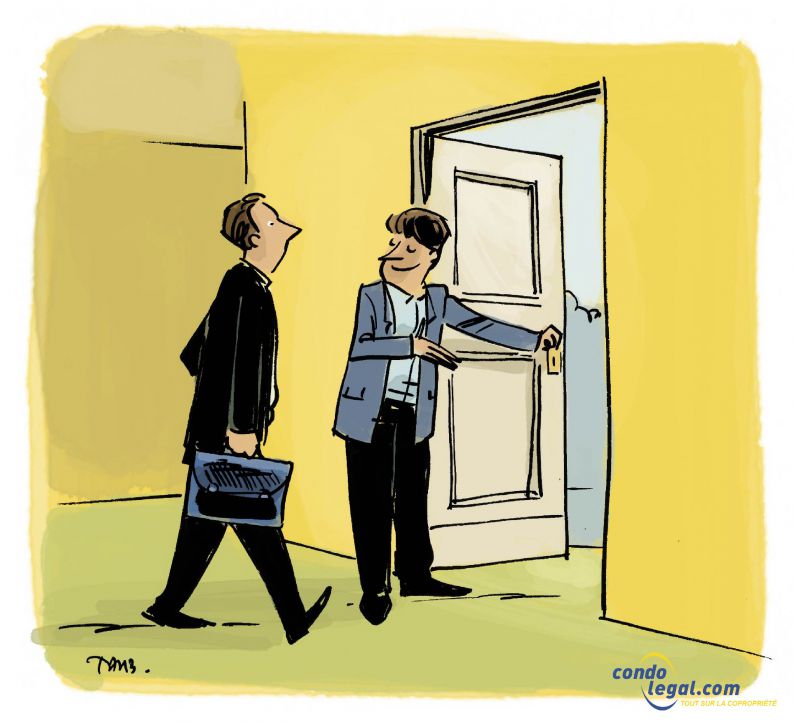
Whatever the type of building they have chosen, all co-owners, without exception, are called upon to participate in meetings of co-owners. Thus they can vote on the questions on the agenda, and take various decisions necessary for the sound operation of the co-ownership. The co-owners are called upon to meet periodically for questions dealing with current administration, maintenance and operation of the syndicate, and sometimes exceptionally for specific questions required by the circumstances. This factsheet is an overview of the various types of Meetings that may be held in a co-ownership.
Special Transitional Meeting
This Meeting is crucial for the future of the co-ownership, as it allows the election of the first Board of Directors of the co-owners. It also requires the provisional administrator, who is usually appointed by the developer in the declaration of co-ownership (By-laws of the immovable), to render an account of his administration. The Special Transitional General Meeting marks a breaking point between two management types, the management of the developer, now ended, and the one of the newly elected board. The extraordinary transitional general meeting must be convened no later than 90 days from the day on which the developer of a co-ownership ceases to hold a majority of votes in the general meeting of the co-owners.
Contrary to many co-owners belief, the Special Transitional General Meeting is not the starting point or the creation of a co-ownership. Its purpose is to transfer the control from the developer to the co-owners, which will be formalized by electing a new Board. The extraordinary transitional general meeting must be convened no later than 90 days from the time the promoter no longer holds a majority of votes at the co-owners' meeting.
Annual Meeting of the co-owners
This General Meeting provides an opportunity for Board members to render an account, both on the administration and management of the co-ownership. The first annual meeting must be held within 6 months of the publication of the declaration of co-ownership. The first annual meeting must be held within 6 months of the publication of the declaration of co-ownership. It can, like any other, be bound by the signing of written resolutions. Subsequently, it must take place every year, as its name suggests, at the latest 6 months following the end of the financial period. However, the declaration of co-ownership may provide for a shorter period, usually 90 days. This being said, the Annual General Meeting of the co-owners allows:
Special Meeting
It usually addresses issues other than those dealt with at the Annual Meeting, which is why it is referred to as “special”. When specific issues arise in a co-ownership, and they cannot wait until the next Annual Meeting to be discussed, a Special Meeting must be called by the
Board, as for example:
Make-up Meeting
This type of meeting results from a postponement of Annual Meeting, caused by the failure to reach quorum, requiring the latter to be adjourned. Subsequently, a notice is given to all co-owners to reconvene it. The next meeting will be a ''make-up'', therefore quorum will not be the same.
Information meeting
This type of meeting is convened by the Board of Directors between two annual meetings. It occurs when the administrators wish to inform co-owners about a particular subject (e.g. garage renovation work) or consult them (e.g., lobby decoration project). At such meetings, no decisional vote is taken. By its nature, it is not, from a legal point of view, an assembly of co-owners, but an informal meeting of co-owners.
 WHAT YOU SHOULD KNOW! Co-owners who wish to convene an annual or special meeting may require the Board do so, by stating in a written notice, the questions to be dealt with. But for the said meeting to be held, the applicant- co-owners must represent ten percent (10%) of the votes of all co-owners.
WHAT YOU SHOULD KNOW! Co-owners who wish to convene an annual or special meeting may require the Board do so, by stating in a written notice, the questions to be dealt with. But for the said meeting to be held, the applicant- co-owners must represent ten percent (10%) of the votes of all co-owners.
 WHAT TO KEEP IN MIND: No decision can be taken without a Meeting, even though a unanimous written resolution can have the same effect as if a meeting had been held. But be careful, do not confuse it with a written consultation, which has no legal value, even if supported by the majority of co-owners.
WHAT TO KEEP IN MIND: No decision can be taken without a Meeting, even though a unanimous written resolution can have the same effect as if a meeting had been held. But be careful, do not confuse it with a written consultation, which has no legal value, even if supported by the majority of co-owners.
 WARNING! The high level of absenteeism at Meetings of co- owners is a real nuisance. Those who are conspicuous by their absence contribute to the paralysis of the destiny of their immovable, because sometime important decisions cannot be taken.
WARNING! The high level of absenteeism at Meetings of co- owners is a real nuisance. Those who are conspicuous by their absence contribute to the paralysis of the destiny of their immovable, because sometime important decisions cannot be taken.
Back to the super factsheet ''The meeting of the co-owners''


